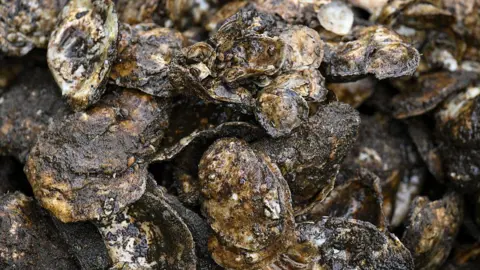Artificial reef aims to bring wild oysters back
 Getty Images
Getty ImagesWild Oysters are set to be introduced into Conwy Bay after an almost two-year delay was brought to an end by a succession of storms.
Bangor University have been given permission to proceed to the final stage of the project and "reseed" a 660-tonne artificial reef.
Harbourmaster Matthew Forbes said the project would "finally move towards completion" with the first distribution run set to take place on Friday.
Wild oysters, once a major part of Wales's fishing industry, have been in decline as a result of over-fishing, changes in water quality, and disease.
It was first reported in July 2023 that Bangor University was working with the Zoological Society of London to reintroduce wild oysters into the waters.
Conwy Council's Harbour Advisory Committee met this week for an update on the project.
Speaking at the meeting, harbourmaster Matthew Forbes said the reef was initially "above the marine licensed permitted height".
"Over the last couple of years, storms have knocked the reef height down," he added.
Mr Forbes said Natural Resources Wales had agreed the project could now move forward and 76 bags of oysters were ready to be distributed.
Meeting chairwoman Joan Vaughan said it would be "lovely" to have oysters in the River Conwy.

Native oysters used to be found around Conwy in large numbers but have virtually disappeared in recent years.
Oyster beds were a common sight in the Menai Strait and around Anglesey.
The Wild Oysters Project website said they were a "vital food source" for coastal communities and "contributed" to the Welsh economy.
The Mumbles or 'Oystermouth' fishery was the largest in Wales supporting 400 fishers across 188 boats.
In the mid-1800s Welsh oyster boats reported landing 8,000 oysters daily, but up to 15,000 to 20,000 oysters in some areas.
The efforts to reintroduce the shellfish in Wales follow a pattern of declining numbers in other parts of the UK.
A wildlife project on the East Yorkshire coast is testing a new breeding technique to reintroduce 500,000 native European flat oysters over the next five years.
It was also mooted that oysters could return to the Thames as part of an effort to clean London's rivers last year.
